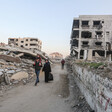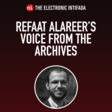The Electronic Intifada Podcast 29 November 2018
On this episode of The Electronic Intifada Podcast: Student supporters of Palestinian rights resist smears, repression and intimidation from UCLA administration, Zionist groups and local lawmakers; Professor Rabab Abdulhadi is vindicated in a fight against a lawfare suit intending to keep her silent.
A recent event on Palestinian rights at the University of California at Los Angeles was subjected to a smear campaign.
Local politicians, pro-Israel groups and UCLA officials all attacked the event – the annual conference of National Students for Justice in Palestine.
“We had a particularly intense series of backlash and events that made it clear to us that not just university administrators, but elected official representatives that are supposed to represent their constituents, are spreading very dangerous, Islamophobic, anti-Arab tropes about what SJP is,” Ayesha Khan of National Students for Justice in Palestine told The Electronic Intifada Podcast.
Despite the attempts to repress it, National Students for Justice in Palestine and Palestinian Youth Movement say that more than 550 people attended the event, “making it the largest student conference focused on the Palestinian struggle to date.”
While pro-Israel advocates pushed for UCLA to cancel the conference, members of the Los Angeles city council unanimously passed a resolution condemning Students for Justice in Palestine. The motion alleged that the conference “undoubtedly would promote anti-Semitism” and that Jewish students on campus would face discrimination.Both claims are well-worn tropes used by Israel lobby groups to distract from criticism of Israel’s crimes against Palestinians.
Taking a page from an Israel advocacy playbook, Paul Koretz, the council member who brought the resolution forward, claimed that SJP members have advocated for violence against Jewish people and linked them to the bigotry that led to the massacre at the Tree of Life synagogue in Pittsburgh in October.
Israel advocates have exploited the murders in Pittsburgh to push harder to restrict speech critical of Israel and to promote a pending federal bill that seeks to blame supporters of Palestinian rights, especially students involved with the boycott, divestment and sanctions (BDS) movement, for anti-Semitism.
A week before the LA City Council’s resolution, the UCLA administration sent students a cease and desist letter claiming that their illustration of a bear on conference promotional materials violated the university’s trademark. The Bruin bear is the university mascot.
UCLA backed down on its demands after receiving a letter from the organization Palestine Legal and the American Civil Liberties Union.
Days before the conference began, UCLA’s chancellor Gene Block wrote that although he agreed with the city council’s accusations against SJP, he would allow the conference to go ahead because he believes in free speech.Ayesha Khan explained that attendees of the conference were verbally harassed by pro-Israel advocates who staged an “aggressive counter-protest” outside the venue. The protest was organized by lobby groups which have “a documented history of assaulting students on campus,” she said.
The protesters held signs accusing SJP of terrorism and shouted racist slogans, Khan said, adding that Paul Koretz from the city council stood amongst them.
Khan said she was spat on by some of the protesters.
In the midst of the repression and attacks, students understood that “it’s so clear that [the Israel lobby] is genuinely afraid that we can do something – that we can actually have some sort of momentum and shift the tide in the United States at least in support of Palestine.”
She added that Israel supporters are “so worried about how we might be able to disseminate some of that truth, and get people motivated and organized – and raise generations of student leaders to be able to care for Palestine.”
The pushback, she explained, “is a sign that we’re powerful and that what we’re doing is important.”
“Vindicated”
After three attempts at litigation in more than a year, pro-Israel lawfare strategists failed to silence a Palestinian American professor at San Francisco State University.
Last month, a federal judge in San Francisco finally dismissed a frivolous lawsuit against professor Rabab Abdulhadi and the university over her Palestine research and criticisms of Israel, which was filed as part of a years-long bullying campaign intended to censor and threaten professors and students who advocate for Palestinian rights.
The lawsuit, filed by the Lawfare Project, a right-wing Israel advocacy group, accused Abdulhadi and her employer of fostering a hostile environment for Jewish students.
“I feel that my scholarship, my teaching, my advocacy for justice for Palestine, as part and parcel of the indivisibility of justice, have been vindicated,” Abdulhadi told The Electronic Intifada. She is the senior scholar of the Arab and Muslim Ethnicities and Diasporas (AMED) program in the College of Ethnic Studies.
Abdulhadi has been a longtime target of Israel lobby groups, which have pressured the university administration to de-fund her department. “The more we were trying to institutionalize the AMED [program], the heavier the attacks and the more defaming and smearing and McCarthyism has taken place,” she said.
Abdulhadi hopes the dismissal of the lawsuit sends a clear message to other professors and students who are facing similar attacks by Israel lobby groups.
“Do not be silent, do not be afraid, do not be shy [about] speaking up for justice for Palestine, for justice for all,” she said.
“I don’t think anyone should have to go through this really hellish experience,” Abdulhadi explained. “But fighting it and having the judge dismiss it with prejudice and coming out and basically saying that none of these allegations are true – that justice work in Palestine definitely does not equate to anti-Semitism, [that] anti-Zionism is not equal to anti-Semitism, that has been quite a vindication.”
Listen to the interviews with Ayesha Khan and Rabab Abdulhadi via the media player above.
Theme music and production assistance by Sharif Zakout
Subscribe to The Electronic Intifada Podcast on Apple Podcasts (search for The Electronic Intifada). Support our podcast by rating us, sharing and leaving a review.





